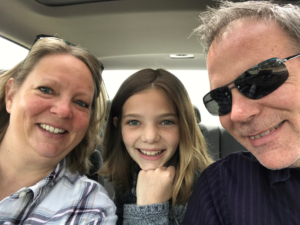5 Things I Wish the Church Knew about Women & Abortion | Guest Blogger, D'Neida King
Oct 17, 2017
D’Neida King had an abortion when she was just 19 years old. Having experienced the hardship of unplanned pregnancy at a young age, without family support, she felt that it was her only option. Since becoming a believer years later, she has felt stuck between the two polarizing debates, pro-life vs. pro-choice, and desires to see the Church embrace a third option that accepts women where they are, supporting them and meeting their needs so that both the woman and the child can thrive. This is D’Neida’s story and the 5 things she wishes the Church knew about women and abortion.

1. No woman, believer or non-believer ever says they want to make a baby just so they can kill it. Ever.
Growing up, my family moved every six months. And no, not because my dad was in the military. My dad was in and out of jobs, and my parents were writing checks for money they didn’t have. We would leave in the middle of the night, and my mom would tell me we were going on vacation. We were never going on vacation… we were moving again.
When I was 17, and a senior in high school, my parents were evicted from another house. They decided to move to Ohio to live with relatives, but this time, I didn’t want to go. I was tired of moving. I was tired of lending them money from the side jobs I had while going to school. Even though I didn’t know where I’d live, I was adamant that I was not going with them.
With basically nothing to my name, I moved in with a lady that I worked with. I lived there for a little while, and was barely making it on my own. And then it happened. At 19, I became pregnant by a guy who I wasn’t even dating.
I was so scared when I found out… I thought, I’m only 19. And then there’s the whole economical side. I had already been thinking about how to work two jobs to afford rent for just me. And then I thought, if I can’t even afford me… how am I going to do this?!
2. Women facing unplanned pregnancy need a community of support, not more reasons to feel shame.
I didn’t tell my family I was pregnant. We didn’t have a good relationship. I didn’t know where to turn. I didn’t know what I would do…
A friend told me to do adoption, and I thought about it, but then I realized people would find out that I was pregnant. And there’s a lot of shame that comes with that. Even though I wasn’t a part of a church, the stigma behind having a child out of wedlock brings judgement.
Another woman actually told me abortion was a lesser of two evils… so… I did it.
If I’d had support, not even necessarily family support, but people who would have helped me, a community, it might have been different. But honestly, I don’t know if it would have been all that different. At the time, I wasn’t interested in church. I actually didn’t even really know about pregnancy centers! I’m guessing they were around at the time, but even if they were, I don’t know that I would have gone to one… because of the shame.
3. Churches have to let go of their “right and wrong” vocabulary.
I think there is sort of a mob mentality. The Church world says, “Pre-marital sex is bad! Abortion is wrong!” And when I have faced these issues, there is a degree of shame because I actually did those things! But that was the “old” me, right? But you don’t say anything because you never know how people will take the news. So you keep quiet and before long, you’re reciting the same things that have been said to you. You start adopting this kind of vocabulary in your everyday life, and you automatically assume that no one in church would do such things.
I remember being in a small group and saying the words, “What the hell?” And people gasped. Because there’s a mentality we’ve adopted that we’re all proper. And that’s what makes the hard conversations so uncomfortable. I think we hear stuff, and we get shocked, but we don’t ask questions and we don’t talk about it.
In the church, we address sexual sin completely wrong because we all want to be “shiny people”, forgetting who we really are. We don’t talk about the real stuff, and everybody believes we have it all together, but we don’t! We’ve all sinned.
We are so quick to say what we believe and don’t believe, but we are not quick to say we love you and accept you, scars and all.
4. The Church has to remember the women sitting in their congregation who may be experiencing unplanned pregnancy, who’ve had an abortion, or who are considering an abortion. Remember that she’s a real person, with real fears, and real needs.
I had said the sinner’s prayer several times during church services, each time thinking I hadn’t done it right. But nothing felt different and no one ever took the time to explain to me that I only needed to say that prayer once. No one walked me through what it meant or how to go about deepening my relationship with our Lord. It wasn’t until seeing The Passion of the Christ that I really realized what that all looked like.
I became a Christian during the movie. I remember sobbing uncontrollably through the entire movie. I remember when the cross got slammed into the ground, and there was a halt in the seriousness of what was going on, and I said, “I’ll do whatever you want.” And then the stone rolled away, and a huge weight lifted from my chest, and I said, “I’m totally in.”
Since becoming a believer, there haven’t been very many people that I’ve told about my abortion.
My husband and I went to many churches after we came to faith, and many of them were not the good, accept-you-as-you-are type places. We met a lot of wolves in sheep’s clothing.
During a sermon at one of the churches we were attending, I became very uneasy. I pushed that uneasy feeling aside because that was the old me.
The Church does not give women who’ve had an abortion support, opening their arms, accepting who they are, where they’re at, meeting their needs, or addressing their fears. At least that’s been my experience. I’ve only ever felt shame.
As believers we have got to change the way we talk about abortion, and the way it’s positioned and presented in Church. We have to put down our political stuff, and listen.
If we want to stop abortions from happening, shaming women is not going to do it.
5. There is a third way to talk about unplanned pregnancy and abortion – Love for both the woman and the child.
Not that long ago, I was listening to a Casting Crowns song in the car with my 11 year old daughter. The song talks about a child who dies. Suddenly my daughter turned to me asked me if I was pregnant before, and if the baby died. I was stunned.
I explained everything, and we wept together. My daughter, experiencing my grief with me, said “I’m so sorry.”
It was the hardest conversation I think I will ever have.
Not long after that, I discovered ProGrace through a Phil Vischer podcast where he interviewed Angie Weszely. I always knew I was not pro-life, but I’m also not pro-choice. I realized making abortion illegal isn’t going to change anything. The ProGrace message resonated with me so much. Honestly, it wasn’t until hearing the podcast that I realized there were many other women feeling the exact same way I felt! I just always thought it was only me that couldn’t quite figure out what to do with that piece of me.
I think in our quest for pro-life in the Church, we’ve dismissed the woman and what she’s going through. Churches need to adopt the ProGrace philosophy because Jesus loves both of the woman and child equally. He doesn’t love the child more, and he doesn’t love the woman more than the child.
AND women could still have an abortion, and He still loves them… This message of love, this third way, gets lost in the pro-life movement.
Stay connected with news and updates!
Join our mailing list to receive the latest news and updates from our team.
Don't worry, your information will not be shared.
We won't send spam, and we will never sell your information, for any reason.

